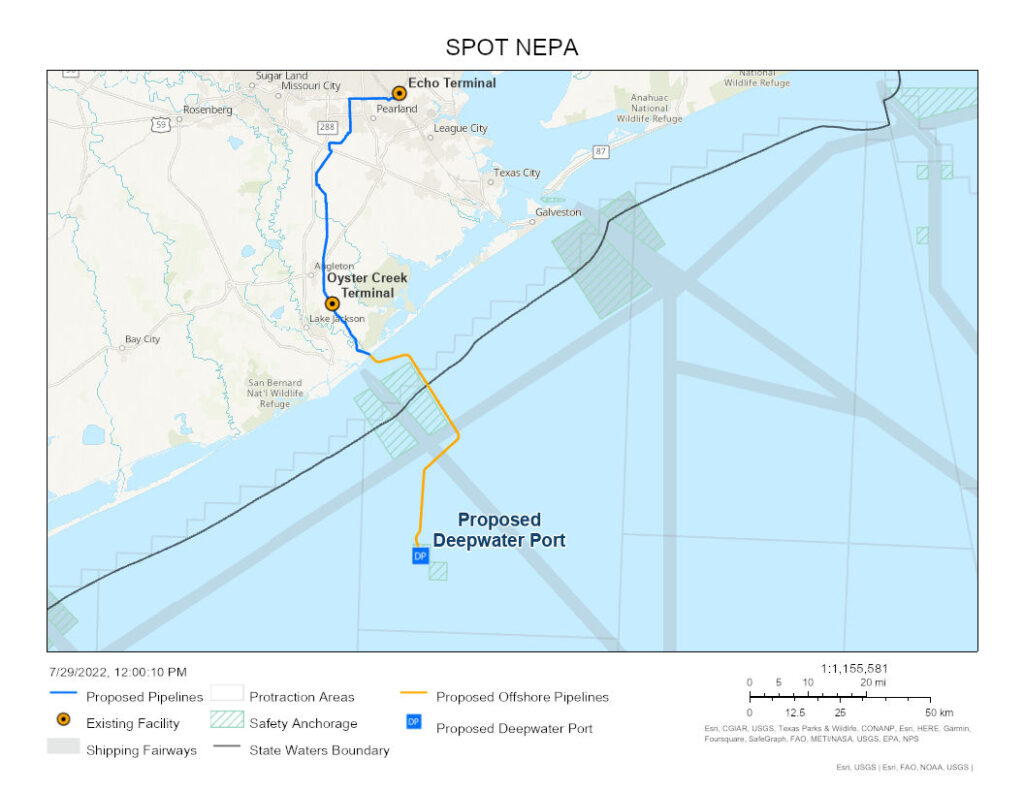Media Contact:
Rebekah Staub, Earthworks, rstaub@earthworks.org
FREEPORT, Texas—The Maritime Administration (MARAD) and US Coast Guard today released the final environmental review for Sea Port Oil Terminal (SPOT), a new crude oil export terminal proposed in Brazoria and Harris Counties by Enterprise and Enbridge that threatens fisheries, wetlands, endangered species, public health and the environment.
The analysis in the final Environmental Impact Statement (EIS) today follows the agency’s review of more than 44,000 comments opposing the project, submitted as part of the proposal’s additional environmental evaluation. MARAD now has 45 days to receive public comments, and 90 days following a public hearing on August 23, Maritime Administrator Ann Phillips will issue a final decision.
Members of the community and supporting organizations have urged MARAD and the US Coast Guard to prepare an EIS that fully evaluates how SPOT threatens endangered species, fisheries, the environment, climate change and local communities. The Surfside Beach City Council in 2020 voted unanimously to oppose SPOT, and the Texas General Land Office has expressed concern about the project’s impacts and environmental review.
“This project would add a tremendous amount of risk to tens of thousands of residents along the Texas Gulf Coast,” said Freeport resident Melanie Oldham. “The Biden Administration must choose our health and our climate over the greed of Enterprise and Enbridge, and deny permits to the SPOT project and all similar fossil fuel export terminals proposed in Gulf Coast communities.”
The upstream and downstream parts of the project would emit 232,975,297 metric tons of carbon dioxide per year, according to part of the analysis, which is equivalent to 62.4 coal plants and over 50 millions cars. Toxic air pollution will be released from the onshore terminal into communities, and there is considerable risk of a major oil spill onshore and in Gulf waters. This also threatens the Kemp’s Ridley sea turtle, the Texas state sea turtle and world’s most critically endangered sea turtle species, that nests on Surfside Beach.
SPOT is one of more than 20 new or expanded fossil fuel export projects in various stages of development along the Texas and Louisiana Gulf Coast that will cause unjust and inequitable community, climate, and environmental impacts. These same communities are also the hardest hit by climate change, which is caused by the emissions from fossil fuel production and use. The oil and gas being exported starts with a hole in the ground, and the massive networks of subsequent infrastructure such as pipelines, refineries, and storage tanks needed to transport, process, and export the fracked oil and gas are allowed to emit large volumes of methane, a greenhouse gas 86 times worse at warming the climate than carbon dioxide.
“The purpose of the environmental review is to ensure that agencies have a clear picture of how SPOT will harm nearby communities and environments,” said Kelsey Crane, Senior Policy Advocate at Earthworks. “MARAD should deny the application to build an export facility in a region already overburdened with pollution and vulnerable to major hurricanes and storms. The Biden Administration must hold to their word in centering climate change and environmental justice in every decision making process. Building a new export terminal locks us into decades of oil being exported on giant tankers in the Gulf Coast and emissions overseas.”



